Advertisement
In
recent
times,
almost
every
trending
issue
in
Ghana
is
accompanied
by
internet
memes.
For
example;
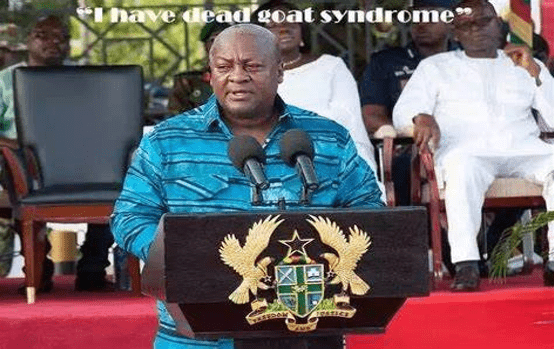
John
Mahama’s
“Dead
goat
syndrome”

Akufo-Addo’s
“Cash
for
seats
saga.”

remember
the
famous
kid
Jake
Amo?
You
may
have
seen
a
lot
of
these
on
the
internets;
they
are
memes,
predominantly
funny
online
images,
videos
and
texts
that
become
viral
through
a
collective
process
of
sharing,
imitation
and
remixing.
The
widespread
adoption
of
internet
memes
as
a
form
of
online
communication
is
transforming
the
way
information
is
shared
and
consumed
among
internet
users.
“The
broader
conversation
around
memes
is
satire
and
parody
and
satire
out
of
which
memes
come
from,
sometimes
play
on
things
that
we
find
funny
anyway.
We
suspect
that
this
is
ongoing,
or
this
is
something
that
people
will
laugh
about
then
we
use
the
opportunity
to
pass
it
through…”
Team
Lead
for
Fact-Check
Ghana,
Kwaku
Krobea
Asante
explains.
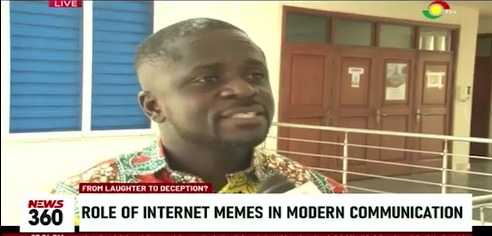
Krobea
Asante
Memes,
with
their
ability
to
convey
complex
ideas
and
emotions
in
a
concise
and
humorous
manner,
have
become
a
popular
medium
for
expressing
various
ideas,
particularly
among
social
media
users.
There
are
memes
for
everything
and
on
anything,
but
why
the
growing
interest
in
memes
among
internet
users?
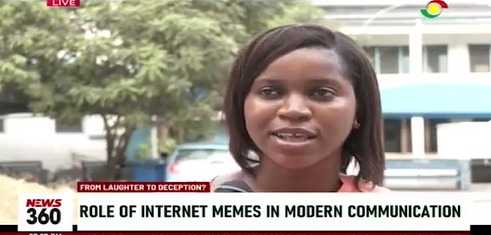
“I
used
to
watch
people’s
statuses
and
they
used
to
post
funny,
funny
memes
and
I
got
interested
in
it
because
it
was
very
funny
and
always
made
me
laugh.
The
way
it’s
funny
and
how
it
relates
to
me.”
–
Jemima,
internet
meme
user
told
3News.
Another
internet
meme
user,
Mary
Sowonu
argued
that
“sometimes,
when
you
are
sad
and
then
you
are
going
to
someone’s
status
or
even
any
social
media
platform
then
you
see
those
things,
you
begin
to
smile.
So
that’s
how
I
got
attached
to
it
and
then
I
do
often
post
them
on
my
social
media
platform,
so
that
I
can
brighten
up
someone’s
day.”
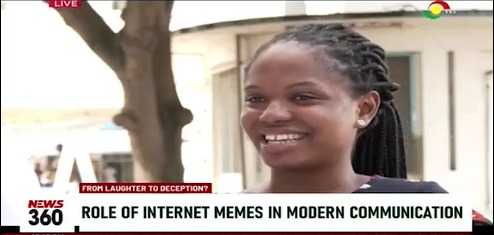
However,
the
persuasive
power
of
memes
combined
with
their
ability
to
spread
faster,
have
also
made
them
a
potential
channel
for
the
spread
of
fake
news
and
misinformation.
Media
Literacy
Advocate
and
a
Research
Analyst
at
the
University
of
Media,
Arts
and
Communication,
Mr.
Stephen
Tindi
contends
that
“memes
are
one
of
the
mechanisms
through
which
people
create
and
sustain
information
disorder.
I
mean
they
use
memes
or
humorous
images
and
the
kind
to
peddle
false
information.
So,
it’s
something
that
has
come
to
our
attention.”
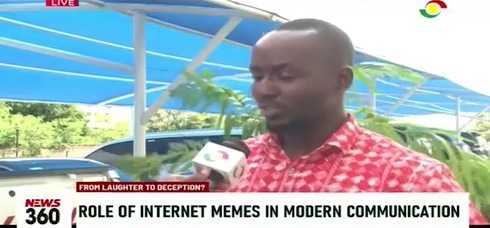
Stephen
Tindi
Despite
their
susceptibility
to
misinformation,
Mr.
Tindi
believe
memes
can
equally
be
used
as
a
marketing
tool
for
promotion.
“The
good
news
is
that
those
doing
‘serious’
communication
can
also
rely
on
memes
to
spread
their
information.
For
example,
nothing
stops
you
after
reading
a
very
long
lengthy
speech
to
take
bits
and
pieces
of
it
to
create
forms
of
communication
that
are
easily
understandable,”
he
asserted.
But,
Team
Lead
for
Fact-Check
Ghana,
Kwaku
Krobea
Asante
wants
such
memes
to
be
shared
with
caution.
He
said
“we
need
to
be
careful
when
it
sustains
negative
narratives,
sometimes
even
misinformation
and
disinformation.
But
clear
hate
speech,
running
funny
adverts
on
the
back
of
tribal
tropes,
gender
tropes
and
stuff
like
that
should
be
avoided
in
the
name
of
sharing
memes.”
While
internet
memes
offer
a
creative
and
engaging
way
to
communicate
online,
their
potential
to
misrepresent
certain
facts
remains
a
significant
concern.
As
Ghana
approaches
the
December
7th
general
elections
and
with
calls
to
combat
fake
news,
it
is
crucial
for
the
general
public
to
share
internet
memes
responsibly
and
verify
information
before
spreading
it.

